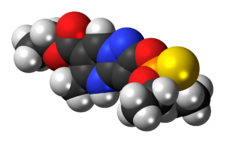Chemistry:Pyrazophos
From HandWiki

| |

| |
| Names | |
|---|---|
| Preferred IUPAC name
Ethyl 2-[(diethoxyphosphorothioyl)oxy]-5-methylpyrazolo[1,5-a]pyrimidine-6-carboxylate | |
| Other names
Curamil (AgrEvo)[1]
| |
| Identifiers | |
3D model (JSmol)
|
|
| ChEBI | |
| ChemSpider | |
PubChem CID
|
|
| UNII | |
| |
| |
| Properties | |
| C14H20N3O5PS | |
| Molar mass | 373.36 g·mol−1 |
| Appearance | Green to brown solid[2] |
| Density | 1.348 g/cm3[2] |
| Melting point | 51 to 52 °C (124 to 126 °F; 324 to 325 K)[2] |
| Boiling point | decomposes at 160 °C[2] |
| 4.2 mg/L[2] | |
| Hazards | |
| Flash point | 32 to 36 °C (90 to 97 °F; 305 to 309 K)[2] |
Except where otherwise noted, data are given for materials in their standard state (at 25 °C [77 °F], 100 kPa). | |
| Infobox references | |
Tracking categories (test):
Pyrazophos is an organic compound used as a fungicide[1] and an insecticide.[3]
Uses
Pyrazophos is a systemic fungicide which is used in orchards, vineyards and vegetable crops against powdery mildew. In some instances, the compound is also an effective insecticide (e.g. against leaf-miner flies).[3]
History
The compound has been commercially available since 1970.[1]
References
- ↑ 1.0 1.1 1.2 Ackermann, Peter; Margot, Paul; Müller, Franz (2000). "Fungicides, Agricultural". Ullmann's Encyclopedia of Industrial Chemistry. doi:10.1002/14356007.a12_085. ISBN 3527306730.
- ↑ 2.0 2.1 2.2 2.3 2.4 2.5 Record in the GESTIS Substance Database of the Institute for Occupational Safety and Health
- ↑ 3.0 3.1 Shanmugasundaram, S.; Yeh, C.C.; Hartman, G.L.; Talekar, N.S. (1991). Vegetable Soybean Research Needs for Production and Quality Improvement. Taipei: Asian Vegetable Research and Development Center. pp. 88–89. ISBN 9789290580478. http://pdf.usaid.gov/pdf_docs/PNABK804.pdf. Retrieved 6 February 2016.
External links
- Pyrazophos in the Pesticide Properties DataBase (PPDB)
 |

